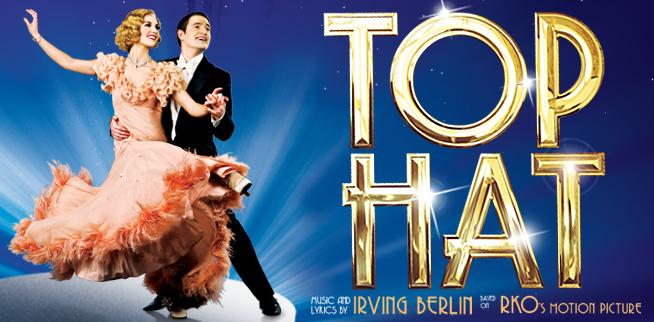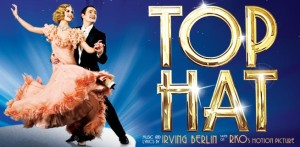The idea of a Tuesday matinee is a such a novelty to me, having grown up on the Broadway regimen of Wednesday and Saturday at 2pm. But in London, there are matinee options for Tuesday, Wednesday, Thursday and Friday. As I had already had Merrily We Roll Along scheduled for that evening, I decided to make one last trip to the TKTS booth in Leicester Square. There were several options, but I went with the new stage adaptation of Top Hat because I so enjoyed Gavin Lee’s performance as Bert in Mary Poppins. Arriving at the Aldwych Theatre a couple hours later, I noticed that the understudy board was up: Lee was out and understudy Alan Burkitt was on. I’m not one to exchange tickets (and frankly I didn’t know if I could), so I plowed on ahead.
With gorgeous costumes, lushly orchestrated songs of Irvin Berlin and Bill Deamer’s dazzling choreography, Top Hat is a feast for the eyes and ears. The trouble with this adaptation of the 1935 Fred Astaire and Ginger Rogers classic is its leaden libretto, slavishly adapted from the RKO screenplay. In fact the libretto credit reads “Based on RKO’s motion picture/Adapted for the stage by” in the programme. In between the dazzling musical numbers are hokey scenes which stretch a silly, paper-thin plot about mistaken identity far past its sell-by date. The jokes are hoary, with many of them landing with a thud, especially in the first act. The second act improves considerably as the farcical machinations go into overdrive, and a new character is introduced to liven up the proceedings. This plot and gags are part of the charm of the ’35 classic, but onstage they become overlong excuses to set up glorious numbers, and it is just not enough to justify a 2 hour, 40 minute musical.
Burkitt and Kristen Beth Williams are both exceptionally talented and did admirable work, but neither were ideal for their parts. They were both given the unenviable task of following in the footsteps of Astaire and Rogers, and neither could shake the ghost of his or her predecessor. (Though to be fair, I’m not sure I could have shaken off the legend of Astaire had I seen Gavin Lee or originator Tom Chambers in the part). Clive Hayward was blustering Britishness in the Edward Everett Horton role of harried producer, and Stephen Boswell had a madcap time as Bates, his eccentric butler. Understudy Russell Leighton Dixon scored big laughs as the over-the-top comic relief, Alberto Beddini, who sings the ridiculous “Latins Know How” in the second act. Best of all was Vivien Parry as the producer’s wife and leading lady’s best pal. Her character doesn’t enter until the top of the second act, but once she opened her mouth I wished she had been onstage from the overture. Out of the entire cast, Ms. Parry had the best grasp on the era and the style required, and was utterly divine in a Bea Lillie meets Beth Leavel sort of way. It would be remiss of me to not point out the large ensemble, who executed the gorgeous dance numbers and specialties with class and elegance.
Director Matthew White did an excellent job staging the show, but should not have been involved in the script adaptation (which he did with Howard Jacques). Deamer’s Olivier-winning choreography is some of the most joyous I’ve seen in years, outside of the City Center Encores! series. Chris Walker’s period appropriate orchestrations and arrangements were sublime, and made the pit sound bigger than it was. While the costumes, hair and make-up were all top notch, the Art-Deco inspired set looked astonishingly cheap in comparison. Top Hat also won the Olivier Award for Best Musical. That doesn’t necessarily mean it will come to NY, but if the folks behind the show have Broadway in their sights, they should seriously consider hiring a librettist to do a major re-write. The joys of the music and dancing aside, the script for Top Hat makes Nice Work If You Can Get It seem groundbreaking.

